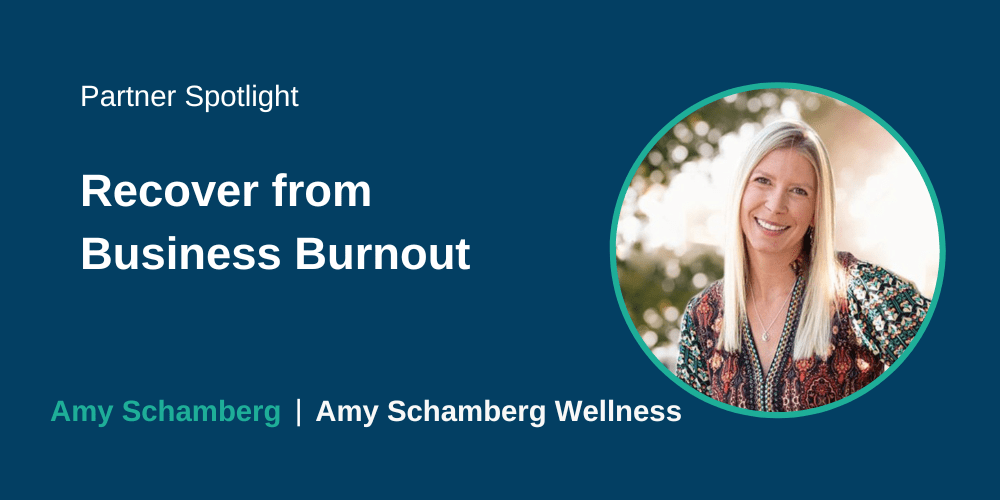Hey, thanks for tuning in to another Partner Spotlight interview at OutsourceSchool.
My name is Connor Gillivan. I’m the CMO and an Owner of Outsource School.
We’re on a mission to help 10,000+ business owners master hiring virtual assistants and freelancers, and industry partnerships is a big way that we’re able to make it happen.
We’re all about creating win-win partnerships where we are able to grow with other companies in the eCommerce, agency, SAAS, and online space.

In this exclusive interview, we have a conversation with John Jonas from Onlinejobs.ph.
John has helped hundreds of thousands of entrepreneurs succeed by teaching them how to replace themselves through outsourcing.
He created OnlineJobs.ph, the largest marketplace to find Filipino workers with over 2,000,000 Filipino profiles in the database. He teaches how to find great Filipino workers.
While making a full-time living he rarely works full time. His team of 37 full-time Filipino virtual assistants do the work in his businesses, while he manages the process. They range from programmers, designers, and webmasters, to writers, researchers, project managers, and just general VA’s.
John has made millions of dollars online directly from work that his Filipino workers have done for him and now teaches others exactly how to do the same thing.
If you’ve tried outsourcing before, but haven’t heard what John has to teach about it, give it another try. John’s teachings are SURE to change the way you look at running your business, outsourcing, and the success you have in doing it.
 Connor: Hey John, thanks for taking the time to chat with us here. We love getting to know our partners better so that our community can benefit from what our partners are offering and doing in the industry. To get started, can you give us a high-level overview of Onlinejobs.ph and how it got started?
Connor: Hey John, thanks for taking the time to chat with us here. We love getting to know our partners better so that our community can benefit from what our partners are offering and doing in the industry. To get started, can you give us a high-level overview of Onlinejobs.ph and how it got started?
 John: Onlinejobs.ph got started out of my need to hire someone without using an agency. When I started it, I wanted to recruit people on my own without an agency being in the middle, and that was impossible.
John: Onlinejobs.ph got started out of my need to hire someone without using an agency. When I started it, I wanted to recruit people on my own without an agency being in the middle, and that was impossible.
So, I designed exactly what I wanted — I built a job board where Filipino workers could put their profile, and then I could see their profiles, and communicate with them directly so that I could recruit someone on my own without someone else in between me and the worker.
 Connor: Love that! Can you dive a bit more into Onlinejobs and how you have Filipinos exclusively on the platform? I’m sure our audience would love to know exactly what problems you could solve for them.
Connor: Love that! Can you dive a bit more into Onlinejobs and how you have Filipinos exclusively on the platform? I’m sure our audience would love to know exactly what problems you could solve for them.
 John: So, when I first started hiring people in the Philippines in 2005, I didn’t know that the Philippines was different. At the time, I just thought outsourcing was outsourcing, and it’s all a problem and a headache. When I hired my first person, though, I found out pretty quickly that is different than India or Pakistan or the US.
John: So, when I first started hiring people in the Philippines in 2005, I didn’t know that the Philippines was different. At the time, I just thought outsourcing was outsourcing, and it’s all a problem and a headache. When I hired my first person, though, I found out pretty quickly that is different than India or Pakistan or the US.
There’s some real significant cultural differences in the Philippines than anywhere else in the world. So when I built it, I built it specifically targeting the Philippines. I didn’t know that so many people around the world would find so much success with the Philippines versus other countries.
I started in 2009. Years after starting it, we found employers around the world flocking to use Onlinejobs.ph, which meant that workers around the world, also, were flocking to Onlinejobs.ph. And we knew that employers were just looking to hire in the Philippines because it’s different from other places.
I’m not saying you can’t find good workers in other places, your chances are just higher in the Philippines, and people know that. And so, we only allow Filipinos exclusively on the platform.
We actually are pretty active with not allowing people from other places on the platform. Specifically, we battle every single day with India and Pakistan. And that purposefully is because employers have a better experience when they know that they’re hiring a person from the Philippines.
So, in general, the problem that we solve for people is giving you access to a really talented workforce that is honest, reliable, loyal, hardworking, they speak American English, they are not entrepreneurial, they don’t want to steal your business, they don’t have a problem working for a male or a female boss, they don’t mind working for a foreign boss, which is very different than a lot of other countries that aren’t really happy with the U. S. right now.
There are a whole bunch of reasons why the Philippines, versus other places, and if more employers knew that, it would start off solving a lot of their problems just by going to the Philippines versus going to India to start off with.
 Connor: Jumping off of that…if there was one problem you’d say that Onlinejobs.ph solves best for your clients, what would it be? Why?
Connor: Jumping off of that…if there was one problem you’d say that Onlinejobs.ph solves best for your clients, what would it be? Why?
 John: Onlinejobs.ph solves multiple problems, but the biggest problem that it solves is giving people instant access to highly talented people that are super easy to find. So, for most small business owners, they don’t know how to find a great programmer, for example, or a great graphic designer, or someone to write their content, or someone they can trust to do specific data entry tasks in their business.
John: Onlinejobs.ph solves multiple problems, but the biggest problem that it solves is giving people instant access to highly talented people that are super easy to find. So, for most small business owners, they don’t know how to find a great programmer, for example, or a great graphic designer, or someone to write their content, or someone they can trust to do specific data entry tasks in their business.
It’s hard to find that person. And that’s really one of the great things, that I didn’t realize as I created Onlinejobs.ph, but it gives you instant access to all these talents. You can immediately find people that have years and years of experience in basically any industry, and they’re not always available to work, but you can certainly always find someone who is available with that skill.
For most people, just knowing — when you have an idea for your business, when you have a task that needs to get done, just knowing, “Oh, I could find someone that can do this, and they already have experience doing this thing,” is a really, really big deal.
And then the next problem that it solves is that it’s affordable. So many business owners can’t find affordable labor. It’s affordable talented labor and a huge, huge market of it — almost three million Filipino profiles as I write this.
 Connor: As the company continues to grow over the next year, what are your plans for expansion? Any new products, offerings, or enhancements to your current services?
Connor: As the company continues to grow over the next year, what are your plans for expansion? Any new products, offerings, or enhancements to your current services?
 John: I don’t really have anything specific for this, but we’re always working on improving the employer experience. We want to make things more transparent, we want to make things easier to understand, we want to make it easier to find the right person.
John: I don’t really have anything specific for this, but we’re always working on improving the employer experience. We want to make things more transparent, we want to make things easier to understand, we want to make it easier to find the right person.
These are things we’re always working on. Over the next year, there aren’t really plans for specific expansion. There aren’t new products or offerings. We really try hard to stick with what we’re good at and to say no to everything else. And what we’re good at is providing a marketplace that gives you access to amazing talent.
We just want to make that marketplace better. We want to add more trust on the worker end, which we’re always working on. We want to add more tools on the employer end to filter, or better ways to post your job, or better ways to figure out salary.
There’s all kinds of things like that that we’re constantly working on. None of them are game changers. They just all combine to make the whole thing easier for employers.
 Connor: And how specifically would you say that Onlinejobs.ph and your team is different from other similar VA marketplace businesses?
Connor: And how specifically would you say that Onlinejobs.ph and your team is different from other similar VA marketplace businesses?
 John: First of all, there aren’t that many VA marketplace businesses. Specifically, I can only think of a couple — Upwork or Fiverr or Freelancer or FreeUp. But all those are all very different than what Onlinejobs.ph does, which Onlinejobs.ph just gives you access to people.
John: First of all, there aren’t that many VA marketplace businesses. Specifically, I can only think of a couple — Upwork or Fiverr or Freelancer or FreeUp. But all those are all very different than what Onlinejobs.ph does, which Onlinejobs.ph just gives you access to people.
We don’t take a markup of salaries, there’s no percentage. So, you pay to access the database at Onlinejobs.ph and then you’re free to do what you want. You can take people outside of Onlinejobs.ph — we hope you take people outside of Onlinejobs.ph and work with them on your own inside of your own company.
We hope you’re bringing in staff rather than outsourcing. We don’t mark up salaries on the back end like most of the other marketplaces. The salary you work out with them is the salary you pay and it’s the salary they receive. We don’t take a cut. We don’t act as a middleman like most others. They put someone in between you and the person you’re working with, which we try not to do.
We try and give the employer as much freedom as possible. Now, the other side of the outsourcing businesses is agencies. And there are thousands of agencies, and they’re all pretty much the same. They’ll come to Onlinejobs.ph to try and recruit people to mark up their salary and then lease them to the employer. And that’s fine.
Most people, though, when they find out about Onlinejobs.ph after finding an agency, rarely go back to an agency to pay that markup again. Instead, they end up working just with that person with nothing on the back-end, like Upwork’s 20% salary markup, or Fiverr’s 40% salary markup. That’s probably the difference between online jobs and other places is we just give you complete access to the people that you’re hiring rather than being in between.
We also try to encourage long-term work rather than short-term work. So, Upwork or Fiverr, the whole purpose of those systems is to create short-term work so that a worker can get a review and then raise prices, which then gives the marketplace more money when that person gets another job because they’re charging more. So there’s more money in the fees. So that person can get another review, complete a job, get a review, and move on to another job — which as an employer, it just means they’re built around 100% turnover for employers.
They talk about you can hire someone long term, but really the whole system is set up so that that person gets a review, so they can move on.
At Onlinejobs.ph, we don’t really do reviews. I mean, we have reviews. But any time someone leaves a review it’s almost always negative from working with someone rather than positive because nobody leaves a positive review for someone that they’re currently working with, which is what we focus on at OnlineJobs.ph.
So if you hire someone, they’re working out for you because they’re staff working inside your business, you don’t go back and leave a review saying, “Oh, hey, this person is really great, hire them away from me.” Which is really, silly to leave reviews saying, “Oh, I found someone amazing. Everybody else, hire them so that they’re not available to work for me anymore.” That’s silly, yet it’s how the entire business of Upwork and Fiverr is built.
 Connor: What’s your outsourcing story? We find that everyone has a different experience when outsourcing and hiring online. What is your first memory that comes to mind?
Connor: What’s your outsourcing story? We find that everyone has a different experience when outsourcing and hiring online. What is your first memory that comes to mind?
 John: Yeah! I have multiple firsts. My first was hiring people locally; I wasn’t bringing in employees, but I tried it four different times to get people to come into my business and do what I wanted them to do. It was pretty simple, and the very first thing they did was quit because they were like, “Oh, you’re making money doing this? That’s not that hard. I’ll just go do that on my own.” I tried it four times locally and all four of them did the same thing. This is 2004.
John: Yeah! I have multiple firsts. My first was hiring people locally; I wasn’t bringing in employees, but I tried it four different times to get people to come into my business and do what I wanted them to do. It was pretty simple, and the very first thing they did was quit because they were like, “Oh, you’re making money doing this? That’s not that hard. I’ll just go do that on my own.” I tried it four times locally and all four of them did the same thing. This is 2004.
Then I tried India. It was really hard. It was just really, really hard. The communication barriers and the cultural differences were just hard. I remember trying to get things done and just being so frustrated time after time after time, that I just gave up. So that was my second outsourcing experience.
When I found Elance — it was Elance at the time, now it’s Upwork, when they merged with oDesk 10 years ago or so — I thought, “Oh, wow, I have finally figured out outsourcing. And I hired this guy and hired him to write articles for me. And then he wrote them, and he sent them to me, and I was so excited because I had gotten all this work done.
Then I realized, his job is to write articles. He doesn’t do the rest of the process. And there’s a whole lot of process that has to go on. And when I went back to him, he didn’t even respond to me because he had gotten paid and had moved on to another job.
And so not only could I not get him to do more article work because he was already working on another job, I couldn’t get him to do the rest of the process. And then when I figured out, “Oh, crap, a bunch of these are plagiarized,” I was just screwed. There was nothing I could do about it.
That was when the whole premise of the freelancer from Upwork fell apart for me. It requires as much effort to find someone upfront at Upwork or Fiverr as it does to find someone upfront at Onlinejobs.ph, and then the amount of onboarding you have to do is the same, but the long term benefit of hiring someone and bringing them into your company is so different than a freelancer.
When I hired my first person in the Philippines, I went and did the same thing — had him write articles. And his first article wasn’t great, but the next one was. And he wasn’t plagiarizing because he didn’t have an incentive to plagiarize because he just worked for me, that was his full-time job. And so if he plagiarized then I’d let him go and he would lose his job. And then after we got the articles right, I was able to teach him the rest of the process.
That is actually my first memory of successfully outsourcing — having someone full-time in the Philippines whose job was to do whatever I asked him to do. We were able to work through things and I was able to outsource the entire process of what I wanted to do by teaching him, “Oh, here’s the first step. Here’s the second step. Here’s the third step,” and I could teach him things over time. Now, that was in 2005.
That guy still works for me today, which is really, really amazing, and that’s another cultural thing with the Philippines that could never happen with Upwork or Fiverr or whatever other platform.
He’s been working for me for 18 years, and he’s not the only one that’s like that. I have people that I hired in 2007, and 2009, and 2010, and 2011 that all still work for me today. And a bunch of that is the culture of the Philippines, some of that is the platform of Onlinejobs.ph where they’re not beholden to another company. They just work with me.
 Connor: Love it! Talking more about outsourcing, what advice would you give to yourself if you were just about to start outsourcing and hiring online?
Connor: Love it! Talking more about outsourcing, what advice would you give to yourself if you were just about to start outsourcing and hiring online?
 John: My advice is different than what you’ll hear online. Most people will tell you to stick with what you’re good at and outsource the rest, and I think that’s terrible advice. I think you should become the CEO of your business — which is probably not something you’re good at — and outsource the things that you are good at because you’ll get similar results if you were to do it yourself, but now you can actually focus on more important things like making sales.
John: My advice is different than what you’ll hear online. Most people will tell you to stick with what you’re good at and outsource the rest, and I think that’s terrible advice. I think you should become the CEO of your business — which is probably not something you’re good at — and outsource the things that you are good at because you’ll get similar results if you were to do it yourself, but now you can actually focus on more important things like making sales.
So, I’m a programmer. I was a programmer by nature, I’m good at being a programmer. Should I stick with being a programmer? Well, being a programmer makes it really, really hard to run a business.
Or if you’re good at social media marketing, well, social media marketing doesn’t build a business, and it’s something that someone in the Philippines can easily, easily do for you, especially if you can show them how you do it and have them do it the way you want to do it.
Or if you’re a really good graphic designer, well, your salary caps is what I’m getting at. If you’re sticking with what you’re good at, which is providing a service to someone, your salary caps because there’s always someone willing to do it cheaper.
But if you’re willing to become the business owner and run a business and hire other people to do the things that you know how to do, then your salary doesn’t cap. Then now you can take on endless amounts of whatever it is, clients or customers or work or whatever because you have other people doing the work.
So, if I were to give myself advice when I was just about to start outsourcing, and the advice that I would give to other people is: hire someone to do something that you know how to do first. Because if you know how to do that thing, you know exactly what talent you’re looking for.
You know how to post a job. You know how to interview someone. You know what skills you’re looking for, you know what the outcome looks like, so you know how to give training. You know what success looks like. You know how to give feedback. It just makes the whole process easier.
And then the consequence of outsourcing this is that you give yourself less to do. Whereas when you outsource something that you don’t know how to do, you’re still doing all of the things that you’re currently doing and it’s taking your time. And now you’ve added one more thing: managing this process that you don’t really understand to your plate. And it just makes the whole thing harder.
So the first thing, and the second thing to do is to outsource tasks that you do know how to do and, hopefully, things that can get some time off of your plate. And then you can move on to other types of tasks — things that you don’t know how to do, things that you’ve wanted to do for a while and you’re not really sure. You can hire someone to build your website, or to custom program that thing, or to build you an app, or whatever it is. After you have freed up some of your mental resources and your time.
 Connor: How about this one…how do you communicate with the people you hire online? What’s your best practices there and how has it changed over time?
Connor: How about this one…how do you communicate with the people you hire online? What’s your best practices there and how has it changed over time?
 John: So, this hasn’t changed over time. Actually, I think that one of the great things about what we do, is we’re hiring people and they are humans with talents and personalities. And people don’t really change over time. If you’re using AI to do stuff, then that’s going to change over time. But I hire people.
John: So, this hasn’t changed over time. Actually, I think that one of the great things about what we do, is we’re hiring people and they are humans with talents and personalities. And people don’t really change over time. If you’re using AI to do stuff, then that’s going to change over time. But I hire people.
And so you ask, how do I communicate with the people I hire online? Well, I communicate with them through email or through a project management system. I guess, really those are the only two ways that I communicate with people, with my team. Project management system, we use Basecamp, or email. I don’t really use chat because I don’t like it. I don’t ever do phone calls with them. I don’t like it and they don’t like it. Occasionally I get texts from a couple of my people, but not very much. And so the way I communicate with my people is very, very simple. Now we have lots of customers — thousands of customers — and they communicate in all kinds of different ways. However you’re comfortable with, you can communicate with your people that way.
I know people that do daily meetings over Zoom with their people. I would never do that, but that doesn’t mean you shouldn’t. Or I know people that have weekly phone calls, or weekly Zoom meetings, or weekly Slack meetings, or whatever it is, doesn’t really matter. You can do it daily. You can do it weekly. You can do it through email.
Inside of Basecamp, we have them check-in. There’s a check-in feature, and everybody writes what they did that day in Basecamp. So I know exactly what’s going on and I can respond to them there. Or we have all kinds of tasks or projects that are going on and everybody’s communicating in there. And that’s how we do it.
But again, there are lots of ways to do this, and there’s not a right way. I haven’t really seen this change over time other than the introduction of Zoom, but that was really just Skype before. People were just using Skype. And so, yeah, this really hasn’t changed.
 Connor: Finally, this is one that I think our community will love, who’s been your best online hire? What do they do for you? Why are they your best hire? Tell us all about them and that story!
Connor: Finally, this is one that I think our community will love, who’s been your best online hire? What do they do for you? Why are they your best hire? Tell us all about them and that story!
 John: So, I don’t have a best. I have so many amazing — and I’ll just tell you a couple of their stories.
John: So, I don’t have a best. I have so many amazing — and I’ll just tell you a couple of their stories.
So the first guy that I hired in 2005, today he runs Onlinejobs.ph. And that’s a new thing in the last two years. He’s been with me since 2005, and over the years, he’s learned so, so much. And now, all of our projects that are going on with Onlinejobs.ph, he’s involved in all of them, and he’s pushing them forward, and he’s giving ideas, and he’s leading things, and so that’s amazing.
I have a girl who writes my newsletter. She’s been with me probably since 2010, and she writes my personal newsletter which goes out to almost 150,000 people, three times a week. And she writes it in my voice and she’s amazing at it. And then she also takes those and posts them on my blog and links the newsletter to the blog post. I don’t even know what else she does. There’s a lot of stuff she does.
Like my video editor. I hired him as a graphic designer and he was like, “Oh, I can also edit videos.” It turned out that not only could he do it, but he was amazing at it and significantly improved our video process, and really just allowed me to do anything I wanted to do with video. I changed from taking so long and so much prep work to do a video, to just doing a video — an ad video, or an informational video, or a promotional video, or whatever — any time I wanted, with my phone, and I could just open it up and record, and it didn’t matter how much I messed up, or how mediocre it was, he makes it look good every time as long as I get reasonable audio. So that has been totally game-changer for me.
So now, I’ll give you an example of this. And both of those people are involved, my newsletter person and my video editor are involved in this. Right now I record a podcast because I don’t have to come up with the content for it. I take the newsletter content, and I don’t have to do anything with it afterwards. And so for years and years and years I heard, “You should do a podcast. You should do a podcast. You should do a podcast.” And I was never willing to do it because I don’t want to spend the time. And then when I realized, I have a really good team now that can deal with this podcast. So I started recording the podcast. And all I would do is read my newsletter. I would read my newsletter in front of a microphone. And then one day I realized, I can also make video out of this. And so because of these two people, and there’s actually more people involved in this, but I open up my camera on my computer and I sit in front of it and go through my newsletter, which we put a lot of effort into the newsletter to make it educational and helpful. And so then I talk through it as a podcast episode with video. And all I do is just record. And then my video editor edits it into a video suitable for YouTube, including intro and outro. He turns that into a podcast episode. Someone uploads that podcast episode to wherever it’s going to go. Someone uploads it to YouTube — the video to YouTube. A blog post gets written from it, it gets linked to the YouTube video and the podcast episode. The newsletter goes out. All of these things happen. There are graphics that are being created. All of these happen from these two people who are so amazing and do so much for me.
Now, the first guy that I hired, Joven, who runs Onlinejobs.ph, isn’t involved in any of that. He doesn’t do any of it. But there are some other people involved in there. Someone else writes another blog post based off of it. I actually have a couple of different programmers that we hired over the years who are just spectacular. I can give them anything I want done, and they will either tell me, “Hey, sir, this is impossible. What you’re asking is really unrealistic.” Or they’ll go get it done and they’ll do a really, really good job with it. And having talent like that is so, so great. We have a customer support person, we hired him just to do customer support, and then over time, he started looking critically at what we’re doing and he started giving us suggestions and improving processes and saying, “Oh, hey, we’re not doing this very efficiently and nobody on our team is doing this efficiently. Let’s change this. Hey, we could also do this.” He started giving suggestions into the quality of things that we were producing and he started taking over quality assurance also.
Just really, really amazing people that are talented. And the best thing about this is, you’d ask for my best hire, I don’t have a best hire, but they just want to contribute. And so many of them want to contribute. They want to do a good job. They want to get promotions. They want to get paid more. They want to take on more responsibility. That’s been my experience so often with hiring people, and it’s so many other people’s experience. Now, obviously, you’re not going to have this experience every single time you hire someone. Or you won’t have it initially very often. Often it takes time before that person is willing to go above and beyond like I’m describing. As most of these people that I’m talking about, they’ve been with me for years and years and they’ve been contributing the whole time.
But sometimes it took them a few years before they were really willing to say, “Oh, he actually wants me to do amazing, amazing stuff. Okay, I can do that.” But it takes you gaining their trust to make that happen.
 Connor: As we close this out, I just have one more question. Where is the best place to find and follow you and the company online? Also, if you have one, is there any special offer that you’ll be offering to the community today?
Connor: As we close this out, I just have one more question. Where is the best place to find and follow you and the company online? Also, if you have one, is there any special offer that you’ll be offering to the community today?
 John: Yes, that’s an interesting one. I am not on social media. I have social media accounts on Facebook and Instagram and LinkedIn — I don’t know. But I don’t get onto any of them because I don’t like social media. And so if you want to follow me, the best place is my newsletter. And you can get onto that at JohnJonas.com. There’s an opt-in there. And I get people all the time asking, “Hey, can you put me on your newsletter?” So that’s the best place.
John: Yes, that’s an interesting one. I am not on social media. I have social media accounts on Facebook and Instagram and LinkedIn — I don’t know. But I don’t get onto any of them because I don’t like social media. And so if you want to follow me, the best place is my newsletter. And you can get onto that at JohnJonas.com. There’s an opt-in there. And I get people all the time asking, “Hey, can you put me on your newsletter?” So that’s the best place.
I don’t have a special offer for you, but I will walk you through how I find great people every time at OneVAAway.com. And that’s something that people often want to know. “Okay, you’ve convinced me that hiring someone in the Philippines is really great. Now, how do I find that person?” Well, I mean, there’s the magic of it, I guess. And at OneVAAway.com I will walk you through that, how I do it. And I’ve developed this process over the years. It’s super simple, super efficient. I do not like to spend time recruiting. I want it to take as little of my time as possible while also ensuring that I find someone great. And I detail that at OneVAAway.com.
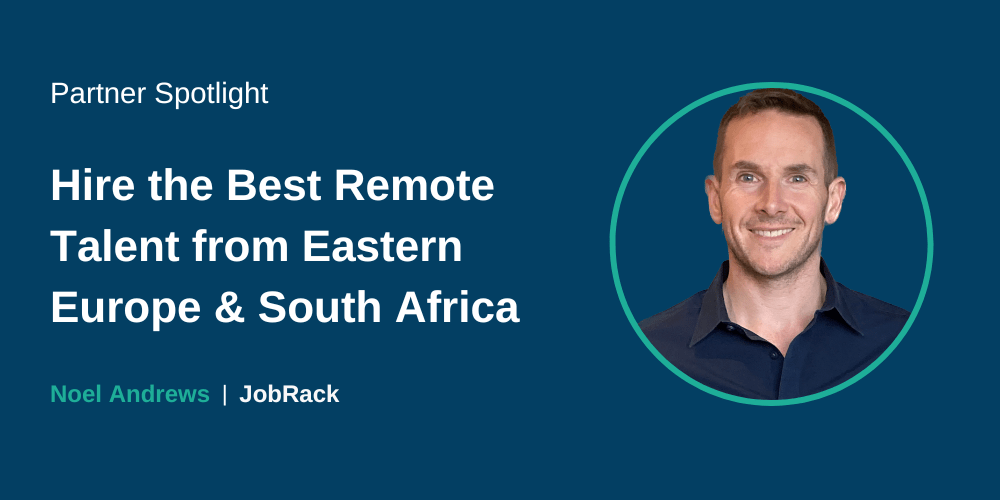
 Connor: Hey Noel, thanks for taking the time to chat with us here. We love getting to know our partners better so that our community can benefit from what our partners are offering and doing in the industry. To get started, can you give us a high level overview of JobRack and how it got started?
Connor: Hey Noel, thanks for taking the time to chat with us here. We love getting to know our partners better so that our community can benefit from what our partners are offering and doing in the industry. To get started, can you give us a high level overview of JobRack and how it got started?  Noel: Sure, JobRack is where growing business owners come to hire actually-awesome remote team members from Eastern Europe.
Noel: Sure, JobRack is where growing business owners come to hire actually-awesome remote team members from Eastern Europe. Connor: Love that! Can you dive a bit more into the hiring services that you offer? I’m sure our audience would love to know exactly what problems you could solve for them.
Connor: Love that! Can you dive a bit more into the hiring services that you offer? I’m sure our audience would love to know exactly what problems you could solve for them.  Noel: We have two services, the main one is our Done With You service. This is where we work as a hiring partner to our clients right from helping them figuring out the right role to hire next, through sourcing and headhunting the very best people, screening, testing and filtering them before presenting them a shortlist of the absolute very best people for their role and team.
Noel: We have two services, the main one is our Done With You service. This is where we work as a hiring partner to our clients right from helping them figuring out the right role to hire next, through sourcing and headhunting the very best people, screening, testing and filtering them before presenting them a shortlist of the absolute very best people for their role and team. Connor: Jumping off of that…if there was one problem you’d say that JobRack solves best for your clients, what would it be? Why?
Connor: Jumping off of that…if there was one problem you’d say that JobRack solves best for your clients, what would it be? Why?  Noel: Finding the best talent.
Noel: Finding the best talent. Connor: As the company continues to grow over the next year, what are your plans for expansion? Any new products, offerings, or enhancements to your current services?
Connor: As the company continues to grow over the next year, what are your plans for expansion? Any new products, offerings, or enhancements to your current services?  Noel: It’s an exciting time in the world of remote hiring and we’re always looking at ways we can expand how we can help our clients more effectively. We’re looking at how we can support our customers even better both through our own services as well as through our partners.
Noel: It’s an exciting time in the world of remote hiring and we’re always looking at ways we can expand how we can help our clients more effectively. We’re looking at how we can support our customers even better both through our own services as well as through our partners. Connor: And how specifically would you say that JobRack and your team is different from other similar businesses in the industry?
Connor: And how specifically would you say that JobRack and your team is different from other similar businesses in the industry? Noel: There’s two main things.
Noel: There’s two main things. Connor: What’s your outsourcing story? We find that everyone has a different experience when outsourcing and hiring online. What is your first memory that comes to mind?
Connor: What’s your outsourcing story? We find that everyone has a different experience when outsourcing and hiring online. What is your first memory that comes to mind? Noel: Before I owned JobRack I was consulting and helping business owners with their team and hiring and I started getting more clients that wanted to hire remotely. I remember presenting a short list of candidates to a client that was running a small data analytics company and he was just blown away at the amazing quality of people I’d found for him in Eastern Europe.
Noel: Before I owned JobRack I was consulting and helping business owners with their team and hiring and I started getting more clients that wanted to hire remotely. I remember presenting a short list of candidates to a client that was running a small data analytics company and he was just blown away at the amazing quality of people I’d found for him in Eastern Europe. Connor: Love it! Talking more about outsourcing, what advice would you give to yourself if you were just about to start outsourcing and hiring online?
Connor: Love it! Talking more about outsourcing, what advice would you give to yourself if you were just about to start outsourcing and hiring online?  Noel: Get help.
Noel: Get help. Connor: How about this one…how do you communicate with the people you hire online? What’s your best practices there and how has it changed over time?
Connor: How about this one…how do you communicate with the people you hire online? What’s your best practices there and how has it changed over time?  Noel: Regularly! For me I treat people like employees and team members, regardless of their legal status or contract mechanism. I’m almost always looking for someone I can work with again and again even if it’s a small task or freelance project but more commonly it’s full-time or part-time team members working with me as part of my core team.
Noel: Regularly! For me I treat people like employees and team members, regardless of their legal status or contract mechanism. I’m almost always looking for someone I can work with again and again even if it’s a small task or freelance project but more commonly it’s full-time or part-time team members working with me as part of my core team.  Connor: Finally, this is one that I think our community will love, who’s been your best online hire? What do they do for you? Why are they your best hire? Tell us all about them and that story!
Connor: Finally, this is one that I think our community will love, who’s been your best online hire? What do they do for you? Why are they your best hire? Tell us all about them and that story! Noel: Oh now that’s a tough one! I have an amazing team so to choose one is just way too hard!
Noel: Oh now that’s a tough one! I have an amazing team so to choose one is just way too hard! Connor: As we close this out, I just have one more question. Where is the best place to find and follow you and the company online? Also, if you have one, is there any special offer that you’ll be offering to the community today?
Connor: As we close this out, I just have one more question. Where is the best place to find and follow you and the company online? Also, if you have one, is there any special offer that you’ll be offering to the community today?  Noel: So for JobRack simply head to https://jobrack.eu or to connect / follow me best bet is LinkedIn.
Noel: So for JobRack simply head to https://jobrack.eu or to connect / follow me best bet is LinkedIn.

 Connor:
Connor:  Jhana: So my background is as a COO and head of operations for different startups. I was originally the COO for a seven-figure marketing agency.
Jhana: So my background is as a COO and head of operations for different startups. I was originally the COO for a seven-figure marketing agency. 
 John:
John: 

 Chris: Smart Author Media was started because I saw a need for the author marketplace and I just found that there were a lot of marketers who were helping with one-time or campaign-based events – things, like best-seller status or launch campaigns of their books. But the authors were underserviced on the ongoing marketing of their books – the ongoing of their assets essentially. So what I found was that they were essentially reliant on marketplaces for selling their books.
Chris: Smart Author Media was started because I saw a need for the author marketplace and I just found that there were a lot of marketers who were helping with one-time or campaign-based events – things, like best-seller status or launch campaigns of their books. But the authors were underserviced on the ongoing marketing of their books – the ongoing of their assets essentially. So what I found was that they were essentially reliant on marketplaces for selling their books.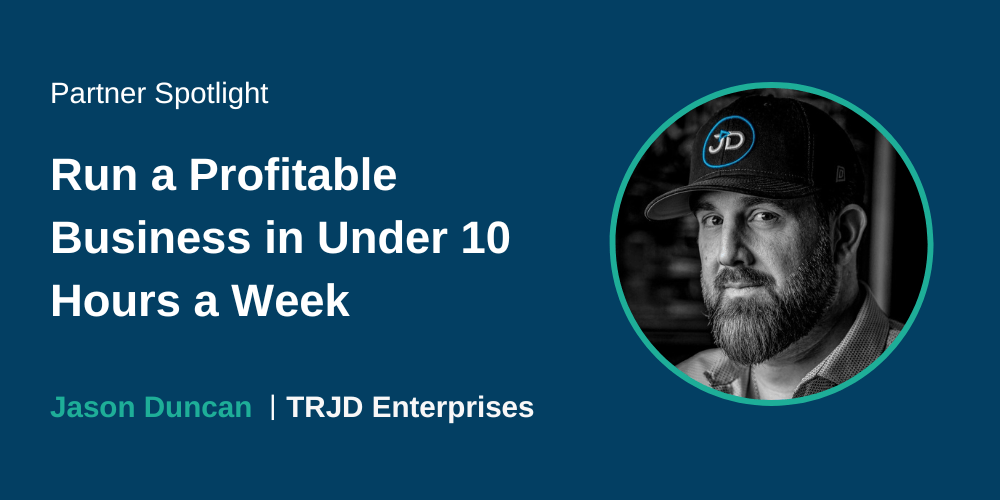
 Jason: I am The Real Jason Duncan. I’m a renowned entrepreneur, best-selling author, 2x TEDx speaker, and podcaster, who is dedicated to helping fellow business owners achieve balance and success–no matter how they define it.
Jason: I am The Real Jason Duncan. I’m a renowned entrepreneur, best-selling author, 2x TEDx speaker, and podcaster, who is dedicated to helping fellow business owners achieve balance and success–no matter how they define it. 

 Connor: Hey Dan, thanks for taking the time to chat with us here. We love getting to know our partners better so that our community can benefit from what our partners are offering and doing in the industry. To get started, can you give us a high level overview of
Connor: Hey Dan, thanks for taking the time to chat with us here. We love getting to know our partners better so that our community can benefit from what our partners are offering and doing in the industry. To get started, can you give us a high level overview of  Dan: I opened my own law practice in 2007 and I’ve always wanted to work with business owners and entrepreneurs. When I had a chance to open my own law firm, we focused on doing business law and eventually became an award winning law firm serving businesses and business owners in the areas of new company formation, trademarks, franchising, and virtual in-house attorney membership program. We are based out of Orange County, California, and have clients all over the world, from new consulting startups to
Dan: I opened my own law practice in 2007 and I’ve always wanted to work with business owners and entrepreneurs. When I had a chance to open my own law firm, we focused on doing business law and eventually became an award winning law firm serving businesses and business owners in the areas of new company formation, trademarks, franchising, and virtual in-house attorney membership program. We are based out of Orange County, California, and have clients all over the world, from new consulting startups to 

 Matija: Absolutely, I’m thrilled to be here. Lancr was born out of a need to simplify the management and payment of remote workers and freelancers. We saw that businesses were struggling with the complexities of contracts, time tracking, and international payments, and we wanted to provide a solution. Lancr offers flexible contracts, powerful time tracking tools, and multi-currency global payouts. Plus, our unique SmartRoute™ system can save businesses up to 75% in fees compared to other freelance platforms.
Matija: Absolutely, I’m thrilled to be here. Lancr was born out of a need to simplify the management and payment of remote workers and freelancers. We saw that businesses were struggling with the complexities of contracts, time tracking, and international payments, and we wanted to provide a solution. Lancr offers flexible contracts, powerful time tracking tools, and multi-currency global payouts. Plus, our unique SmartRoute™ system can save businesses up to 75% in fees compared to other freelance platforms.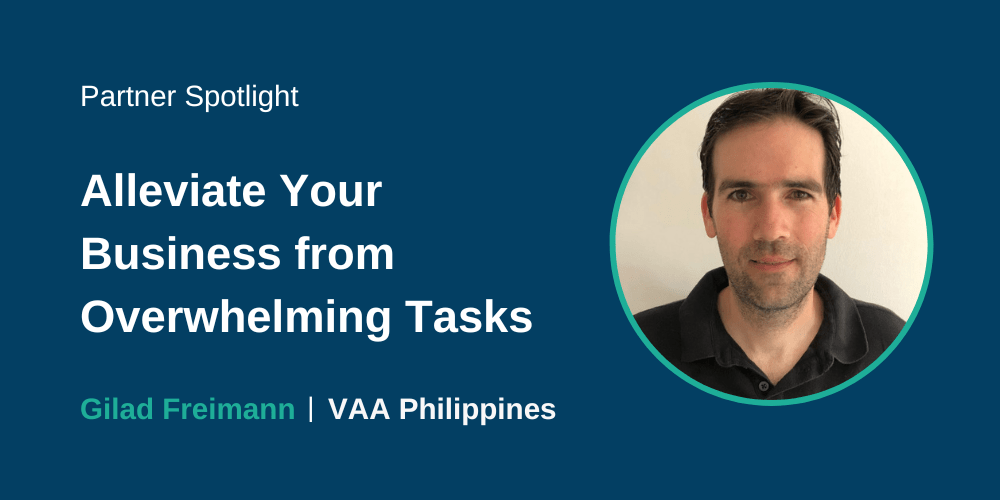
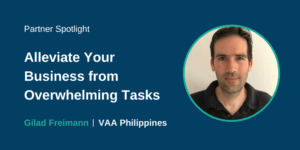
 Gilad:
Gilad: 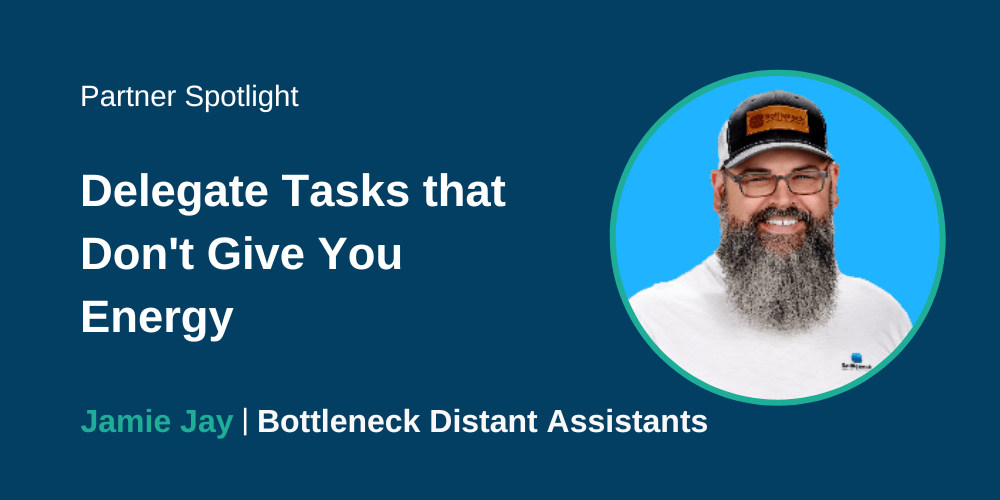
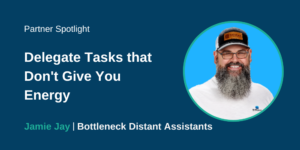
 Jaime:
Jaime: 